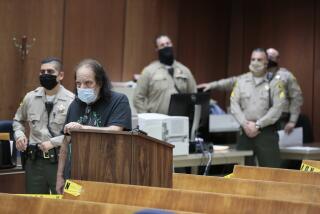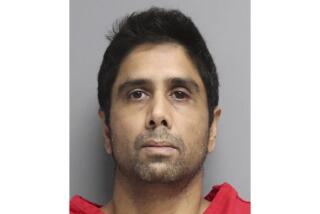Judge OKs Quadriplegic’s Plea to Die
- Share via
LAS VEGAS — A Nevada judge cleared the way Friday for a 31-year-old quadriplegic to end his life after hearing his ailing father testify that his son has no hope of recovery and wants to die before him.
District Judge Donald Mosley granted a petition for declaratory relief sought by an attorney for Kenneth A. Bergstedt, who has been paralyzed and hooked to a respirator since a 1969 swimming accident.
“He wants to go before I do,” Bergstedt’s father, Robert, testified. “There’s no future for him. He knows he’ll never walk again. He knows he has to depend on someone else the rest of his life.”
Mosley, however, ordered the state attorney general’s office to appeal to the Nevada Supreme Court and cautioned the elder Bergstedt against acting hastily.
“Do not feel a compunction to do so, either because of this ruling or because of public pressure,” Mosley said. “This merely allows you the option.”
Mosley ordered the expedited appeal so the Supreme Court could set a precedent in the case. Nevada currently has no laws governing such cases.
“One district court judge’s opinion does not put this to rest,” Mosley said. “For the residents of the state of Nevada, and for Kenneth Bergstedt, a definitive resolution needs to be had.”
The younger Bergstedt, who did not attend the hearing, had petitioned Mosley for an order that would allow a doctor to give him a sedative and disconnect him from the respirator that helps him breathe.
He has been paralyzed from the age of 10, when his neck was broken by a girl who jumped on him while he was swimming in a pool. Doctors testified he has no chance of regaining any bodily function.
Robert Bergstedt said his son had wanted to end his life for 17 years, ever since he came to the realization that he had no hope of recovering from the injuries that shattered any chance of leading a normal life.
“He sees all these things are denied him that a normal man would do,” Bergstedt said. “When he started realizing there was no cure . . . he expressed then his desire to die.”
The elder Bergstedt said his son decided to seek a court order allowing him to die after hearing of a similar case about 18 months ago in California.
He said his son, who spends most of his time on a gurney and cannot feed himself or handle any of his bodily functions, gets no pleasure out of life and sees no reason to continue living.
“I’m not overjoyed with it,” Bergstedt said of his son’s desire to die. “But I do consent with what he’s doing. I can see why he’s doing it.”
Bergstedt, who has cared for his son on a 24-hour basis since his mother died in November, 1978, said his son fears being put in an institution when the father dies. The elder Bergstedt, who is 65, has only one leg, suffers from high blood pressure and said a spot was recently discovered on a lung.
The request for the order was not opposed by Deputy Atty. Gen. Donald Haight, who said he based his opinion on Kenneth Bergstedt having a constitutional right to privacy.
“A competent, rational adult has the authority to regulate his medical care, including the right to refuse medical treatment,” Haight said. “It would appear Mr. Bergstedt has the right to do what he requested.”
During the hourlong hearing, a neurosurgeon testified that Kenneth Bergstedt would not get better and a psychiatrist testified that he was mentally competent.
“I told him it’s between him and his God,” said Dr. Albert Howard Capanna. “I think he’s very content with his decision.”
More to Read
Sign up for Essential California
The most important California stories and recommendations in your inbox every morning.
You may occasionally receive promotional content from the Los Angeles Times.













